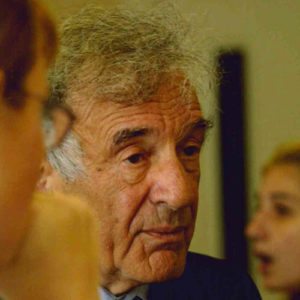A celebrated author. A patient teacher. A caring employer. A thoughtful mentor.
It was in these roles that I progressively came to know Elie Wiesel, and the last one is what’s most significant to me as I write about Professor Wiesel today. When we first met, he was co-teaching a one-month course in which I fortuitously acquired an enrollment spot. You might think that taking a class with someone of Elie Wiesel’s stature (combined with the nigh impossible amount of reading he assigned per class) would stifle classroom discussion until all one would hear in between his comments would be the shuffling of chairs and the errant coughs of nervous students.
But it was just the opposite. Professor Wiesel actively encouraged and listened to students’ interpretations of Camus’s Myth of Sisyphus or Pirandello’s Six Characters in Search of an Author, often offering his own insights or suggesting further avenues through which students could refine and deepen their own comments.
Professor Wiesel’s nurturing comments and thoughtful lectures led me to enroll again in his course the following year. Then, after I graduated, I found myself interning for the nonprofit organization that he and his wife, Marion Wiesel, co-ran, The Elie Wiesel Foundation for Humanity, while preparing applications for graduate school the year after. When I began writing this memorial of Professor Wiesel, I instantly thought of the following episode that occurred while working alongside him:
I often accompanied Professor Wiesel to his house (which was a short walk from the Foundation) to assist him in carrying materials or to deliver gifts and miscellanea to his home. One of these trips occurred near the end of the workday, and as I was packing my things and exiting the office with him, he saw what I was reading: Henri Bergson’s On Laughter.
He immediately responded, “Ah, Le Rire,” the original French title of Bergson’s work. I engaged him in a discussion of Bergson’s description of a sort of inelasticity as a fundamental part of what makes something laughable and Bergson’s account of the social function of laughter. And, as we walked the few blocks toward his home, he recalled passages almost verbatim of Bergson’s essay, shared some of his insights about the text as well as when he first encountered it, all while remaining almost dangerously aloof of the heavy foot (and car) traffic of a Manhattan evening.
It’s moments like those that capture something quintessential about my interactions with Elie Wiesel. The way he remained incessantly impressive in his memory of philosophical and literary texts, to the point where he would disregard all else around him, the way he dedicated himself to discussing ideas and thinking together as if his thirst for learning were never sated. But, above all, what I most cherish about those moments is the warmth and genuine sincerity he showed toward a fellow interlocutor, and that’s something I’ll remember forever.
—Tony Leyh ’13


